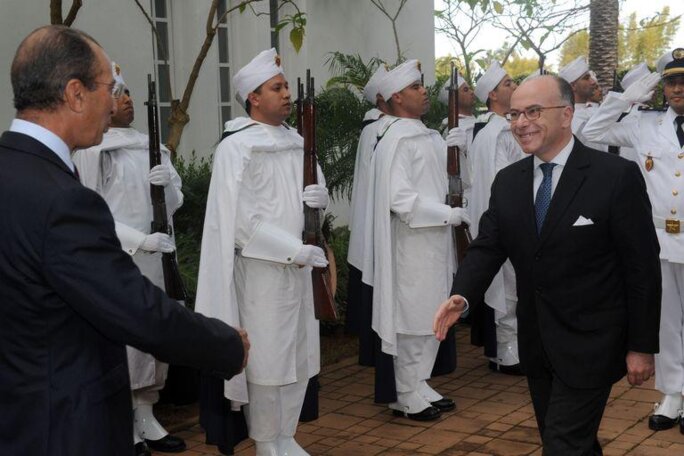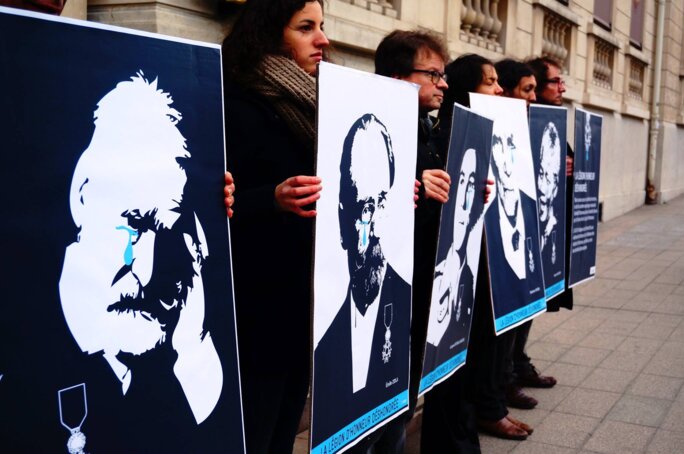Human rights groups have accused the French authorities of capitulating to pressure from their Moroccan counterparts over a new agreement on judicial cooperation between the two countries. Last Tuesday, June 16th, Members of Parliament on the National Assembly's foreign affairs committee backed the accord, which Paris hopes will bring a definitive end to more than a year of bitter discord between the two nations. However critics say the measure could undermine the independence of French judges and courts and will mean that victims of alleged crimes at the hands of Moroccan authorities will be too afraid to make formal complaints in France. “In the face of Moroccan demands, France has completely caved in,” says lawyer Patrick Baudouin, honorary president of the International Federation for Human Rights (FIDH).
The origins of this judicial accord and the bitter row behind it go back to February 2014. A Parisian judge was tipped off by a lawyer that one of the most influential figures in Morocco, Abdellatif Hammouchi, director of the country’s internal intelligence agency the Direction générale de la surveillance du territoire (DGST), was in Paris. The judge was keen to question him as part of an investigation into a formal complaint lodged by a 33-year-old French-Moroccan called Adil Lamtalso alleging torture, complicity in torture and non-assistance of a person in danger against the Moroccan authorities. In the formal complaint Abdellatif Hammouchi is alleged to have been complicit in the torture.

It is unusual for judges to be made aware of the presence of such powerful figures on French soil, as these officials are usually as discreet as they are powerful. So, according to several sources, the judge acted quickly and dispatched police to summon the head of the Moroccan DGST for questioning, without knowing the nature of the address at Neuilly-sur-Seine, in the western suburbs of Paris, to which she was sending the officers. On the evening of Thursday February 20th, 2014, no fewer than seven armed officers duly arrived at the address, which turned out to be the official residence of the Moroccan ambassador in France. Hammouchi himself was absent. But the Moroccan interior minister was there, in a briefing with journalists. The Moroccan authorities were furious.
Within a short time the diplomatic channels between the two countries were buzzing. “Of course it was legal, but it was cavalier in the way it was carried out. The Moroccans got very worked up, very quickly...” recalls one diplomat. The next day France's ambassador to Morocco was called in by the ministry of foreign affairs “to make clear the kingdom's vigorous protest”. Mohammed VI's regime then cancelled a conference and meetings with Nicolas Hulot, the French president’s special envoy on the protection of the planet, which were scheduled for a few days later.
The apologies offered by France's ministry of foreign affairs made little difference. This was despite the fact that the French ministry even suggested it could meddle in the French judicial investigation into the torture affair. It said in a statement: “In response to the Moroccan authorities, we have immediately asked that all light be shone on this regrettable incident as soon as possible, in the spirit of friendly trust that links France and Morocco.” But the Moroccan regime still felt that it had not been taken seriously. Then president François Hollande himself telephoned Mohammed VI. “They spoke to remove any misunderstanding and to reaffirm the very close friendship between Morocco and France. If there was an 'affair', it is over. The misunderstanding has been dispelled,” said the Elysée at the time.
But it was all in vain. Morocco froze judicial and security cooperation between the two countries and hundreds of cases on issues as diverse as drug trafficking, commercial litigation, and child kidnapping immediately suffered as a result. Overnight, according to several sources, the Moroccan intelligence authorities stopped sending any further information to their French counterparts. “The repercussions were very damaging because of the exceptional quality of the exchanges [of intelligence] with the Moroccans. France continued to send information but did not have any direct information in return for more than a year,” said Élisabeth Guigou, the socialist chairwoman of the Assembly's foreign affairs committee.
In July 2014 communications between the two countries were virtually non-existent, leading François Hollande to launch a number of initiatives in an attempt to restore links with Mohammed VI and his government. He appointed Guigou as his representative – she has strong links with the Moroccan regime and was herself born in Marrakesh – and she flew to the capital Rabat to meet the king. Then on July 30th prime minister Manuel Valls went to the Moroccan Embassy in Paris for the Fete du Trône, the annual ceremony marking the anniversary of Mohammed VI's coronation, accompanied by justice minister Christiane Taubira.
But the Moroccans, who were also offended by the fact that foreign minister Salaheddine Mezouar's belongings had been searched at Roissy-Charles-de-Gaulle airport on March 26th, and by protests by French-based Moroccans near Mohammed VI's château north-east of Paris – were not placated. In talks with French counterparts Moroccan officials said they felt “humiliated”, that the regime had made progress on human rights that other countries had not, without those countries suffering the same humiliation as them and that the French had “prejudices” against the kingdom. The Moroccans even claimed that there was a pro-Algerian lobby inside the French government. “The Moroccans thought they had suffered a terrible affront. Even more so given that Morocco had for several years committed itself to democratic reforms. Change that has never since wavered,” said Élisabeth Guigou.
To put right what former French education minister Jack Lang – who also has close links with Morocco – described as a “hurtful act”, the regime in Rabat wanted total immunity for all its senior figures and complete control over the judicial fate of its nationals. “The kingdom asked us for subsidiarity,” was the view of Paris, in other words that all legal issues relating to Moroccans should be dealt with by the North African country alone. The problem was – and is - that this is impossible. Under French law France has what is known as universal jurisdiction, meaning it can investigate and try certain crimes, such as torture and terrorism, in France whether or not the acts were committed on French soil and whether or not they involved French citizens. And the independence of French examining magistrates and the confidentiality of their investigations are guaranteed by law.
Head of Moroccan intelligence services decorated by France
In October 2014 the king of Morocco cancelled his planned visit to France to inaugurate an exhibition on Morocco at the Arab World Institute in Paris. “He was supposed to be coming in the context of a state visit,” says Jack Lang, president of the institute and a regular visitor to Morocco. “But he sent his sister Princess Lalla Meryem. The choice of this recognised figure was nonetheless a sign that dialogue hadn't been completely broken.”
“Your Highness, your presence here among us bears witness once again to the link between Morocco and France and I ask you in particular to salute His Majesty Mohammed VI with whom I have had friendly relations since I became president of the Republic,” stated President Hollande at the start of his speech at the inauguration. “We each need each other, Morocco, France, and France, Morocco … I recall that King Mohamed VI was the first head of state that I received at the Elysée in May 2012 [editor's note, the month he came to power],” Hollande added. The princess, meanwhile, came back to the institute on February 1st, 2015, to bestow honours on three religious figures, all well-known to prime minister Manuel Valls. They were Khalil Merroun, head of the mosque at Évry, south of Paris, where Valls used to be mayor, Rabbi Michel Serfaty from nearby Ris-Orangis and Michel Dubost, Bishop of Évry. The prime minister himself also attended.
The result of all this was that on January 31st, and after long months of negotiations, France's justice minister Christiane Taubira announced the end to months of non-cooperation on judicial and security issues with the signing of an agreement with her Moroccan counterpart. The tone of the press release – it speaks for example of an “additional contribution to the close, strong and multidimensional relationship between the two countries” - is further indication of the great efforts made by the French government to appease Rabat.
At a stroke both judicial and security cooperation between the two countries resumed. Exchanges of intelligence with the Moroccan intelligence services – which had already taken place after the terror attacks in Paris in early January – also started up again, even if cautiously. Several ministers visited Rabat, including foreign minister Laurent Fabius and prime minister Manuel Valls himself.
In February interior minister Bernard Cazeneuve even went as far as to announce that France was going to make Abdellatif Hammouchi an officer of the Légion d'honneur, a higher distinction than that of knight or 'chevalier' of the Légion d'honneur that most people receive. Hammouchi had also been promoted in his home country, combining the post of director of the DGST with that of director general of the national security agency the Direction Générale de la Sûreté Nationale. This sign of deference towards the intelligence and security chief has been criticised off the record by several French sources but it was one of the Moroccan authorities' demands. An official ceremony may be organised for the bestowal of the decoration on July 14th. “France had already had occasion to distinguish Monsieur Hammouchi in 2011 by awarding him the title of knight of the order of the Légion d'honneur. It will soon once again show its esteem by this time awarding him the insignia of an officer,” explained Cazeneuve during a visit to Rabat.

Enlargement : Illustration 3

Last winter the French authorities also pointedly declined to protest over the expulsion of two journalists from the agency Premier Ligne who were making a documentary in Morocco for French public broadcaster France 3. In February the king of Morocco returned to Paris and was received at the Elysée, and at the end of May a series of bilateral agreements were signed followed a meeting between representatives of the two governments in Paris.
Officially the new agreement on judicial cooperation should favour “more efficient cooperation between the two countries and reinforce the exchange of information on a more durable basis”. But according to many observers this comes at the risk of undermining the independence of the French justice system and the universal jurisdiction of French courts. In effect the protocol asks French examining magistrates in charge of cases involving events that took place in Morocco to inform the authorities there before giving priority to a “referral” to the Moroccan justice system. In short, in the event of a torture complaint against Abdellatif Hammouchi priority would be given to it being transferred to Morocco and investigated there.
The non-governmental organisations who deal with human rights issues are furious about the protocol. “For us a red line has been crossed. They have created a diplomatic text, except that it remains a legal one. It's thus very dangerous. All the more so as it risks serving as a precedent,” says Hélène Legeay, in charge of Maghreb and Middle East issues for the organisation Action by Christians Against Torture (ACAT), which has been targeted by Morocco.
“Of course it was necessary to put an end to the discord between France and Morocco,” says lawyer Patrick Baudouin, honorary president of the International Federation for Human Rights (FIDH). “But what is much less respectable is that they haven't reached an honourable agreement. In the face of Moroccan demands France has completely caved in. It is acting in a way today that gives priority to its interests over its values! They've just agreed impunity to potential major criminals or even torturers.”
“Victims will no longer make a complaint in France because they risk being threatened. It's an obstacle to justice,” says Geneviève Garrigos, president of the French branch of Amnesty International, which recently produced a report on the endemic torture in Morocco. Two of the organisation's researchers were recently expelled from the kingdom.
'The fight against terrorism puts the rule of law at risk'
Other organisations have also attacked the accord with Morocco. On May 21st the French governmental human rights watchdog the Commission Nationale Consultative des Droits de l’Homme (CNCDH) recommended that the agreement be “withdrawn or rejected” and stated its “resolute opposition to this adoption of this bill”. Its president Christine Lazerges says: “The language is deliberately imprecise and is written in 'Quai d'Orsay language' [editor's note, a reference to the Paris address of the French foreign ministry] but it raises serious risks.” She adds: “In particular it opens the door to depriving multilateral agreements such as the Convention against Torture of any meaning. France could get round its multilateral international commitments through a bilateral agreement. It's a backwards step in international law. Once again, the fight against terrorism puts the rule of law at risk.”
Judges' unions, whose members the French authorities are relying on to limit the perverse effects of the protocol, are also hostile. “Yes, [judicial] cooperation had to be restored but not at any price,” says Mathilde Zylberberg of the Syndicat de la magistrature (SM). In a press release the SM spoke of what it called “little agreements among friends” and of an “unacceptable abandonment” of the confidentiality of the investigation process and investigations, and the undermining of France's international commitments.

Enlargement : Illustration 4

Another judges' union, the larger Union Syndical des Magistrats (USM), was more moderate in its tone, but nonetheless considers that the agreement “leaves a hole in relation to the independence of the justice system”, in the words of its president Virginie Duval. “You sense that it's a very diplomatic text but it's an unwelcome flaw,” she says. Neither the USM or the SM judges' unions were consulted in advance on the text by the foreign ministry or the justice ministry. Justice minister Christiane Taubira has “absolutely no comment” to make, according to a ministry spokesman. Nor did she protest back in 2013 when a socialist bill backed by the French Senate, which would have broadened the universal jurisdiction of the French judicial system, was buried by the National Assembly.
In reality the entire French government is ill at ease with the Morocco accord. The Elysée and the government ministries are usually more talkative about their international accords. The problem with this one is the growing controversy over a measure that everyone recognises is “rather favourable to Morocco”, to use a phrase bandied around in the prime minister's official residence Matignon, or which “poses a symbolic problem”, in the words of one minister. The Elysée insists that France had no choice but to sign this agreement; the Moroccan authorities are indispensable in the fight against terrorism and too many civil cases were affected by the freezing of judicial cooperation. Officials say that in view of what the Moroccans were demanding, this agreement limits the damage.
In their discussions with non-governmental organisations and human rights groups the French authorities now accept that the protocol is vague and poorly-written by normal judicial standards. But according to officials this means that in practice nothing will change and that a judge will remain free to decide on a case's fate. “The text negotiated is more political than legalistic and can thus lend itself to different interpretations,” agrees Élisabeth Guigou. “No, we are not deviating from universal jurisdiction; we respect the independence of French judges and also the confidentiality of the investigation process,” says Guigou, herself a former justice minister. “The text may lend itself to different interpretations but we are not calling those principles into question. It is about offering exceptional cooperation, but one which does not undermine those principles.”
As a sign of the French authorities' desire to control the debate over the protocol, it was Élisabeth Guigou herself who was chosen to pilot the bill through its debate in the foreign affairs committee last Tuesday, June 16th, and for its debate on the floor of the Assembly on June 23rd. In fact, last Tuesday's debate did not even last two hours and there was little real debate even in that time as nearly all MPs backed the agreement.
MPs from the Socialist Party and the right-wing Les Républicains (LR - formerly the UMP) voted for it, while the communists were absent. Only the green MP and former minister Cécile Duflot opposed it. Indeed, with the exception of Duflot it was Élisabeth Guigou who expressed the most reservations about the agreement. “This text contains some difficulties in interpretation,” she admitted to fellow MPs. “It's true that as a text it suffers from a lack of precision but it does not call into question our internal law nor our international commitments,” she said. Guigou said the aim of the protocol was to send a “strong message” to Morocco which had been “hurt” by the attempt to summon Abdellatif Hammouchi for questioning. “It's an act of confidence and a political gesture,” she told MPs.
There is little doubt that the agreement will get the backing of MPs on the floor of the Assembly later this week. However, in a sign of the government’s own unease about the measure, during last Tuesday's debate Élisabeth Guigou was still unsure which minister would be coming to defend it before MPs. Neither foreign minister Laurent Fabius nor Christiane Taubira were very enthusiastic to do so; even though it was those two who negotiated the text of the protocol in the first place.
-----------------------------------------------------------------
- The French version of this article can be found here.
English version by Michael Streeter


